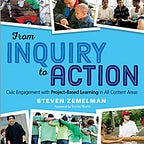Teachers — We Can Help the Kids Learn to Take Thoughtful Action on Gun Violence So They Succeed
The Florida school massacre appears to have awakened young people to begin standing up for change — thank goodness for them and shame on those of us who haven’t done so.
I don’t want to sound like I’m capitalizing on a terrible tragedy (actually a long string of them). But taking social action strategically and successfully requires learning skills and using careful thought. The great social activists of our time, like King and Chavez, knew how to exercise those skills and that thinking. So to help make sure the energy and anger don’t go for naught, we teachers can guide our students to be smart and strategic as they speak out for better safety for young people (and for all). But how many of us know how to engage in effective social action, ourselves, or help others learn to do so as responsible citizens? For a few years now I’ve been learning from and writing about great teachers who do the work of supporting that kind of student inquiry and action brilliantly.
So what do those teachers do?
- They help students gather and analyze information, root causes, and policy options so they can speak with authority and choose actions wisely.
- They guide students to analyze the power structure they are dealing with, so they can determine which responsible leaders to seek to sway and how to couch their arguments.
- They encourage students to identify thoughtful actions most likely to lead to change.
- They help students develop leadership and collaboration skills so they can work together effectively.
- They empower students to take the lead, using careful judgment about when to stand back and when to step in to teach or provide support.
- And they support these young people when they encounter obstacles or discouragement.
If you want help on how to support this kind of democratic citizenship learning in your classroom, there’s a growing collection of resources. Here are a few:
- Go to the website of the Mikva Challenge to download their Issues to Action curriculum (in this case you might not use all of it, but lessons on the key steps and strategies are there).
- Get and read Making Civics Relevant, Making Citizens Effective, by Daniel Millenson, et al.
- Or if you’d like to be inspired by a great story from a teacher trying this approach for the first time, buy a copy of Spectacular Things Happen Along the Way by Brian Schultz.
- Browse this blog for ideas and powerful classroom stories that can help you see how to do this essential educational work in your classroom.
- So OK, I wouldn’t mind if you took a look at my book, too — From Inquiry to Action from Heinemann. It combines real classroom accounts with how-to steps. (You can read the introductory chapter for free on the website.)
But this time let’s not just stand by while our young people do all the hard work of learning and acting in a democracy.
